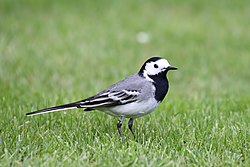wagtail
Hello, you have come here looking for the meaning of the word wagtail. In DICTIOUS you will not only get to know all the dictionary meanings for the word wagtail, but we will also tell you about its etymology, its characteristics and you will know how to say wagtail in singular and plural. Everything you need to know about the word wagtail you have here. The definition of the word wagtail will help you to be more precise and correct when speaking or writing your texts. Knowing the definition ofwagtail, as well as those of other words, enriches your vocabulary and provides you with more and better linguistic resources.

White wagtail (Motacilla alba)
English

Etymology
From a partial suppletion of Middle English wagstert (literally “wag-tail”), equivalent to wag + tail.
Pronunciation
Noun
wagtail (plural wagtails)
- Any of various small passerine birds, principally of genus Motacilla, of the Old World, notable for their long tails.
- (zoology) Ellipsis of wagtail platy.
Hyponyms
- African wagtail, African pied wagtail (Motacilla aguimp)
- Cape wagtail (Motacilla capensis)
- citrine wagtail (Motacilla citreola)
- field wagtail (Motacilla flava and M. tschutschensis, syn. Budytes spp.)
- forest wagtail (Dendronanthus indicus)
- garden wagtail (Dendronanthus indicus, syn. Nemoricola indica)
- grey wagtail (Motacilla cinerea)
- Japanese wagtail (Motacilla grandis)
- Madagascar wagtail, Madagascan wagtail (Motacilla flaviventris)
- Mekong wagtail (Motacilla samveasnae)
- mountain wagtail (Motacilla clara)
- pied wagtail (Motacilla alba yarrellii)
- wagtail flycatcher (Motacilla alba yarrellii)
- water wagtail (Motacilla alba yarrellii)
- white-browed wagtail (Motacilla maderaspatensis
- white wagtail (Motacilla alba alba)
- willie wagtail, willy wagtail (Rhipidura leucophrys)
- winter wagtail (Motacilla cinerea)
- wood wagtail (Motacilla cinerea, syn. Calobates sulphurea)
- yellow wagtail (Motacilla flava and M. tschutschensis)
Derived terms
Translations
various small passerine birds
|
See also
References
 wagtail on Wikipedia.Wikipedia
wagtail on Wikipedia.Wikipedia  Motacillidae on Wikispecies.Wikispecies
Motacillidae on Wikispecies.Wikispecies  Category:Motacillidae on Wikimedia Commons.Wikimedia Commons
Category:Motacillidae on Wikimedia Commons.Wikimedia Commons - “wagtail”, in OneLook Dictionary Search.